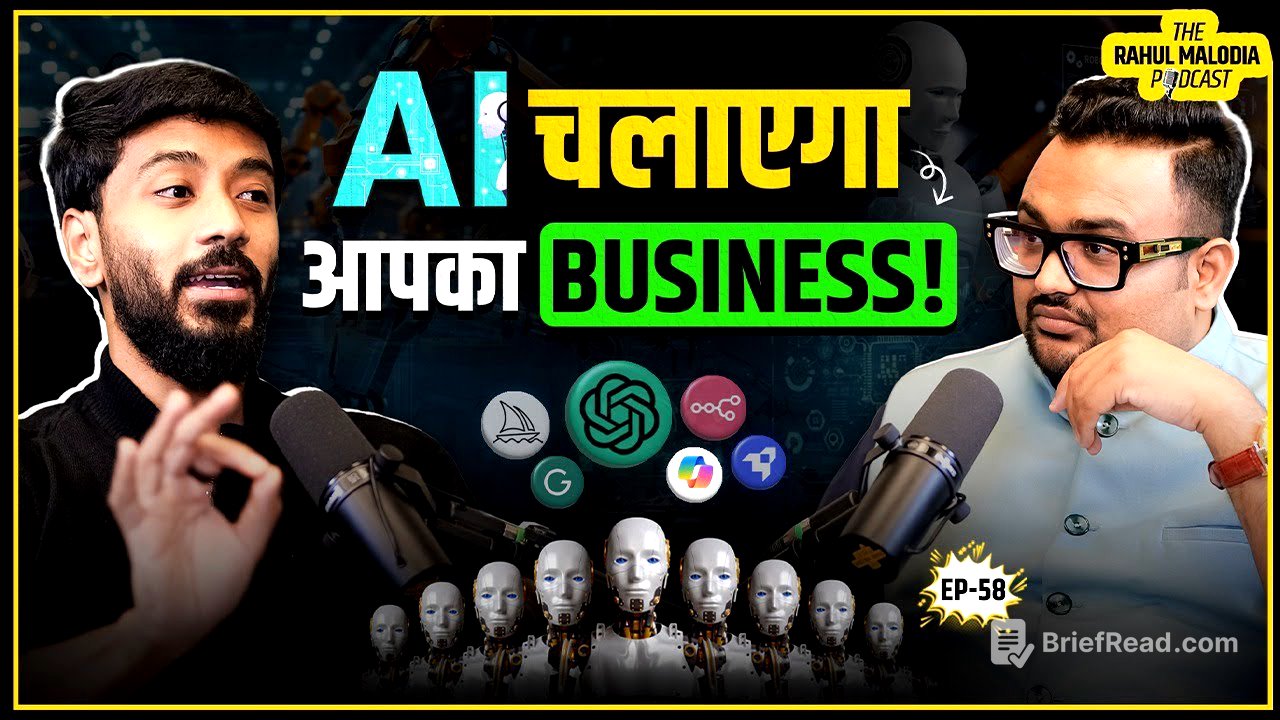TLDR;
This podcast episode explores the transformative potential of AI for businesses of all sizes, debunking the myth that AI is only for large corporations. It emphasizes AI's ability to enhance marketing, sales, and overall efficiency while reducing costs. Vaibhav Sisneeti shares practical strategies and tools for leveraging AI in various business functions, from lead generation and content creation to customer retention and team management. The discussion also touches on the future of AI, including the rise of AI agents and the importance of becoming an AI generalist to stay competitive.
- AI is not just for big companies; small businesses can also benefit significantly.
- AI can enhance marketing, sales, and efficiency while reducing costs.
- AI agents are becoming increasingly prevalent, automating tasks and improving productivity.
- Professionals in various fields, such as doctors and lawyers, can leverage AI to save time and improve accuracy.
- The future belongs to those who embrace AI and become AI generalists.
Introduction [0:00]
The podcast introduces the concept of AI and its growing presence in various aspects of life and business. It highlights the misconception that AI is limited to large corporations and emphasizes its potential to revolutionize small businesses. The discussion aims to demystify AI and provide practical insights into how it can be leveraged for growth and efficiency.
What's In The Podcast? [1:32]
The podcast aims to dispel fears surrounding AI and showcase its potential to increase business tenfold. It emphasizes that AI is not just for big businesses but also for small traders, focusing on how to use AI to improve marketing, sales, and reduce costs. Vaibhav Sisneeti, an AI expert, shares insights on using AI for audience finding, ad creation, team training, and customer service across various departments like accounting, finance, and HR. The podcast is presented as a masterclass and blueprint for integrating AI into business, encouraging listeners to take notes and apply the knowledge to their businesses or jobs.
Is AI Only For Big Companies? [3:38]
The discussion addresses the misconception that AI is only beneficial for large companies like Google, Meta, TCS, and Reliance. Vaibhav clarifies that while big companies have been using AI for a long time, the current focus is on generative AI, which can be a force multiplier for businesses of all sizes. He explains that AI can reduce costs and increase efficiency by optimizing workflows and empowering employees. Vaibhav also shares a quote from Vinod Khosla, who predicts that small companies will disrupt Fortune 500 companies by leveraging AI.
Do You Still Think AI Hasn’t Arrived Yet? [6:27]
The conversation tackles the perception that AI is still in the future and hasn't fully arrived. Vaibhav argues that AI is already here but people often equate it with simple tools like Chat GPT. He explains that AI agents are now capable of autonomously performing tasks, citing his own experience of growing his YouTube channel from 2,000 to 200,000 followers in seven months without shooting any videos, thanks to AI. Vaibhav emphasizes that AI can help with team management, allowing businesses to scale without proportionally increasing headcount. He references Sam Altman's vision of a billion-dollar company run by a single person, supported by AI.
How AI Can Transform Marketing? [12:10]
The discussion shifts to how AI can transform marketing, focusing on lead generation. Vaibhav explains that AI can help convert 100 leads into 1000 by automating cold calling and cold emailing. He introduces AI voice agents that can make hundreds of calls simultaneously, acting as a virtual team. These agents can also handle objections and follow up automatically, overcoming the limitations of human sales teams. For cold emailing, AI agent swarms can find prospects, verify email addresses, and send personalized emails at scale.
Can AI Help In Copywriting & Ad Scripts? [19:44]
Vaibhav shares a playbook for improving ad script writing using AI. He suggests analyzing successful ad scripts from competitors using tools to convert videos to transcripts. These scripts are then fed into AI models like O3 (a reasoning model) to identify common elements. The insights are used to write new scripts using AI tools like Claude, increasing the odds of creating winning ads. Vaibhav emphasizes that AI can act like a rockstar copywriter, analyzing scripts and generating new ones in minutes, a task that would take humans much longer.
Finding the Perfect Target Audience Using AI [25:59]
The conversation explores how AI can help find the right target audience for ads. Vaibhav explains that AI can analyze data from existing customers and leads to identify buyer personas. This data is then used to refine ad targeting, ensuring that ads are shown to the most relevant audience. Vaibhav notes that as ad platforms move towards open targeting, AI becomes even more important for creating compelling ad creatives that resonate with the target audience.
How To Create & Optimize Content With AI? [31:01]
Vaibhav shares his process for creating and optimizing content using AI. He emphasizes a data-driven approach, using AI to identify trending topics and automate content creation. He suggests using RSS apps to monitor social media and identify viral posts. AI can then be used to generate content based on these trends, tailoring it to the creator's style and audience. This process automates idea generation and ensures that content is relevant and engaging.
AI For Product Optimization & Visibility? [34:52]
The discussion turns to product optimization and visibility, particularly for online sellers. Vaibhav suggests analyzing winning product listings in a category to identify successful descriptions, titles, and copy. This information can be used to optimize product listings, improving their visibility and appeal. Vaibhav emphasizes that AI can act as the smartest employee in the world, capable of doing anything if given the right instructions.
How AI Can Boost Inbound Sales? [36:29]
Vaibhav explains how AI can boost inbound sales by automating the IVR process. He suggests creating a voice agent that can handle inbound calls, answering questions and providing information. This AI agent can handle thousands of calls simultaneously, providing instant responses and freeing up human agents to focus on more complex issues. Vaibhav also discusses the concept of "human in the loop," where AI hands off critical or high-value interactions to human agents.
What Exactly Are AI Agents? [41:56]
Vaibhav defines AI agents as AI employees that can perform end-to-end tasks. He explains that an AI agent is essentially a software program that knows a job and has the tools to do it. Vaibhav emphasizes that using AI effectively requires knowing the tools and how to use them. He encourages listeners to explore different AI tools and experiment with them to find the ones that work best for their needs.
How AI Helps In Customer Retention? [44:09]
The conversation shifts to customer retention, emphasizing the importance of cross-selling and up-selling. Vaibhav explains that AI can track customer behavior and preferences, allowing businesses to personalize messaging and offers. He suggests using AI to follow up with customers after a purchase, asking about their experience and offering relevant products. This personalized approach can increase customer loyalty and drive repeat sales.
What's The Cost Of Using AI Tools? [46:00]
Vaibhav discusses the cost of using AI tools, noting that his company spends ₹15,000 per month on AI. However, he emphasizes that it's possible to start for free using tools like Gemini and Chat GBD. Vaibhav explains that the cost of AI voice agents is based on usage, making it a cost-effective solution for businesses. He encourages listeners to experiment with different tools and scale their AI usage as they see a return on investment.
Using AI To Get More Customers In Your Store [47:38]
Vaibhav explores how AI can help retail businesses increase foot traffic. He suggests using targeted ads with geo-location to reach customers within a specific radius of the store. Vaibhav also recommends using AI to create images of models wearing the store's clothing, which can be used in ads and social media. He introduces tools like Hazen to create videos from these images, making the ads more engaging.
How AI Can Speed Up Manufacturing? [52:12]
The discussion turns to how AI can speed up manufacturing processes. Vaibhav suggests using Gemini or Chat GPD to analyze the manufacturing process and identify inefficiencies. He recommends using Perplexity Deep Research to research how other companies have solved similar problems. Vaibhav shares an anecdote about a consultant who was using AI to create presentations, highlighting the potential for AI to automate tasks and improve efficiency.
Google Vs Perplexity AI - Which Is Better? [56:24]
Vaibhav compares Google and Perplexity AI, explaining why he prefers Perplexity. He notes that Google provides a list of links, while Perplexity provides a direct answer based on multiple sources. Vaibhav explains that Perplexity uses AI models to research the internet and provide a single output with citations. He also mentions that Google is launching Edge AI Mode, which is similar to Perplexity.
Future Of Ad-Driven Companies Like Google & Meta? [1:01:03]
The conversation explores the future of ad-driven companies like Google and Meta, as well as D2C companies that rely on ads. Vaibhav predicts that Google is moving towards a subscription economy, with paid tiers for Gemini and other services. He also notes that Google is creating products like one-tab payment to facilitate e-commerce transactions. Vaibhav suggests that D2C companies should focus on building communities and creating their own audience.
How Professionals Like Doctors & Lawyers Can Use AI? [1:09:45]
Vaibhav discusses how professionals like doctors and lawyers can use AI to save time and improve accuracy. He notes that there are specialized AI tools being developed for these professions, such as Harvey for lawyers and Age Med Geminae for doctors. Vaibhav predicts that AI will play an increasing role in legal and medical fields, automating tasks and improving decision-making.
How to Stand Out When Everyone Uses AI For Content? [1:15:37]
The conversation addresses the challenge of standing out when everyone is using AI for content creation. Vaibhav emphasizes the importance of original thinking and using AI as a force multiplier, not a replacement for human creativity. He suggests using AI to generate ideas and test them, then adding a personal touch to the content. Vaibhav also notes that the way you use AI is what differentiates you from others.
How HR Can Use AI For Smarter Hiring? [1:18:31]
Vaibhav explores how HR can use AI for smarter hiring. He suggests using tools like Fathom Buster to identify potential candidates on Lindin and automate outreach. Vaibhav also recommends using AI to screen resumes and conduct initial interviews, saving time and improving the efficiency of the hiring process.
How AI Saves Time For Business Owners? [1:21:04]
Vaibhav shares how he uses AI as an executive assistant to save time. He uses tools like edge NA10 and Firefly AI to automate tasks such as writing emails, scheduling meetings, and taking notes. Vaibhav also uses a physical AI device to record meetings and summarize them, ensuring that he doesn't forget anything.
Is AI The Future Of Business Growth? [1:26:22]
The discussion emphasizes that AI is the future of business growth, providing an unfair advantage to those who adopt it early. Vaibhav compares AI to a golden well, noting that it's important to extract the gold before it's gone. He encourages listeners to embrace AI and become AI generalists to stay competitive.
How To Get Started With AI - The Right Process! [1:28:31]
Vaibhav outlines a process for getting started with AI, emphasizing the importance of identifying problems and finding the right tools to solve them. He recommends building an AI toolkit and experimenting with different tools. Vaibhav also shares a roadmap for becoming an AI generalist, which includes learning prompting, working with text, images, videos, and audio, creating AI agents, and building products with AI.
How To Start Your AI Learning Journey? [1:33:32]
Vaibhav provides guidance on starting an AI learning journey, recommending tools like meet emly and Notebook LM for consuming content and gathering knowledge. He also suggests using comm, an AI agentive browser, to automate tasks and improve efficiency. Vaibhav emphasizes the importance of commitment and consistency, encouraging listeners to dedicate time each day to learning about AI.
Final Words [1:39:20]
Vaibhav concludes by emphasizing the opportunities that AI presents, noting that those who lose their jobs due to AI can become entrepreneurs by teaching AI or creating AI-powered solutions. He encourages listeners to embrace AI and become true entrepreneurs, capable of adapting to the changing landscape.









